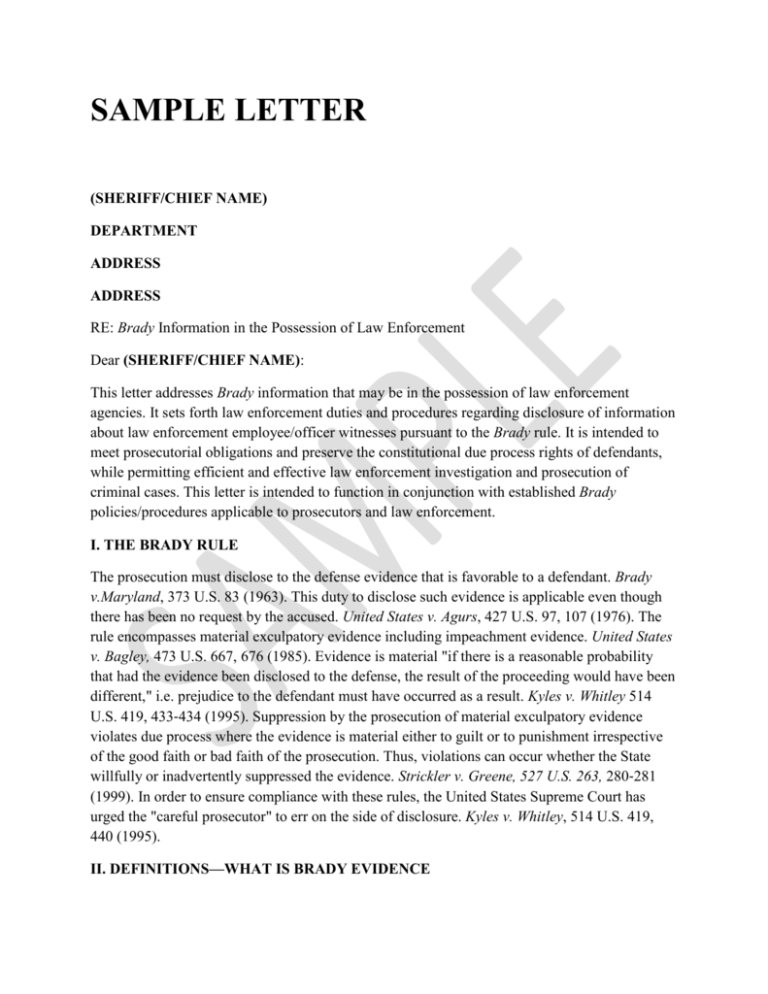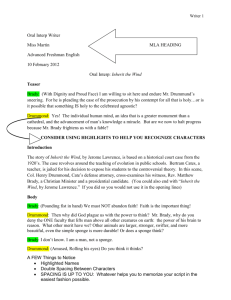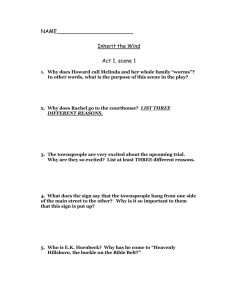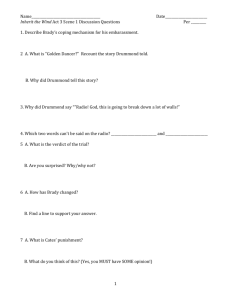Brady Letter Template - The Justice Clearinghouse
advertisement

SAMPLE LETTER (SHERIFF/CHIEF NAME) DEPARTMENT ADDRESS ADDRESS RE: Brady Information in the Possession of Law Enforcement Dear (SHERIFF/CHIEF NAME): This letter addresses Brady information that may be in the possession of law enforcement agencies. It sets forth law enforcement duties and procedures regarding disclosure of information about law enforcement employee/officer witnesses pursuant to the Brady rule. It is intended to meet prosecutorial obligations and preserve the constitutional due process rights of defendants, while permitting efficient and effective law enforcement investigation and prosecution of criminal cases. This letter is intended to function in conjunction with established Brady policies/procedures applicable to prosecutors and law enforcement. I. THE BRADY RULE The prosecution must disclose to the defense evidence that is favorable to a defendant. Brady v.Maryland, 373 U.S. 83 (1963). This duty to disclose such evidence is applicable even though there has been no request by the accused. United States v. Agurs, 427 U.S. 97, 107 (1976). The rule encompasses material exculpatory evidence including impeachment evidence. United States v. Bagley, 473 U.S. 667, 676 (1985). Evidence is material "if there is a reasonable probability that had the evidence been disclosed to the defense, the result of the proceeding would have been different," i.e. prejudice to the defendant must have occurred as a result. Kyles v. Whitley 514 U.S. 419, 433‐434 (1995). Suppression by the prosecution of material exculpatory evidence violates due process where the evidence is material either to guilt or to punishment irrespective of the good faith or bad faith of the prosecution. Thus, violations can occur whether the State willfully or inadvertently suppressed the evidence. Strickler v. Greene, 527 U.S. 263, 280‐281 (1999). In order to ensure compliance with these rules, the United States Supreme Court has urged the "careful prosecutor" to err on the side of disclosure. Kyles v. Whitley, 514 U.S. 419, 440 (1995). II. DEFINITIONS—WHAT IS BRADY EVIDENCE Recurring Government Witness Recurring government witness are those law enforcement employees/officers for whom it is reasonable to believe will or may be called to testify more than once or on a regular basis. Exculpatory Evidence Evidence is exculpatory if it is evidence that is favorable to the defendant, is material to the guilt, innocence, or punishment of the defendant, and impeachment evidence that may impact the credibility of a government witness, including law enforcement officers. Exculpatory evidence must be disclosed. Materiality Evidence is material only if there is a reasonable probability that had the evidence been disclosed to the defense the result of the proceeding would have been different. A “reasonable probability” is established when the failure to disclose the evidence could reasonably be taken to put the whole case in such a different light as to undermine confidence in the verdict. Such evidence must have a specific, plausible connection to the case, and must demonstrate more than minor inaccuracies. Evidence is material if it is facially apparent as exculpatory. Impeachment Evidence Evidence that might be used to impeach a witness is exculpatory evidence and must be disclosed to the defense by the prosecutor. Impeachment evidence is evidence that demonstrates that a witness is biased or prejudiced against a party, has some other motive to fabricate testimony, has a poor reputation for truthfulness or has past specific incidents that are probative of the witness’ truthfulness or untruthfulness. Prior inconsistent statements are impeachment evidence. Impeachment evidence that is merely cumulative (i.e., duplicative to evidence already provided or presented) or impeaches on a collateral issue need not be disclosed. Admissibility of impeachment evidence is determined on a case by case basis by the courts. Therefore, even evidence that is likely to be inadmissible can still be considered Brady information, and thus be required to be submitted to the prosecutor. III. LAW ENFORCEMENT AGENCY DUTIES Generally Law enforcement officers must collect and document exculpatory and impeachment information discovered pursuant to administrative and criminal investigations and provide the same to the prosecution. Law enforcement agencies with information that could impeach any non‐law enforcement witness must provide that information to the prosecution as well. Training All employees must be properly trained on the department’s obligation to disclose Brady information. For the purposes of this chapter, employee means anyone employed by the agency who may be called to testify under oath. However, the existence of this letter and a copy should be made known and available to all employees. Employer–Employee Agreements regarding Law Enforcement Conduct Law enforcement agencies shall investigate all complaints regarding their officers in accordance with their established policies. If an agreement, settlement, or other understanding is reached between an agency and an employee regarding a complaint, investigation or response, the agency should consider the impact of the subject matter of the complaint, investigation or response on the employee’s ability to serve as a witness in any criminal proceeding for any jurisdiction. IV. LAW ENFORCEMENT AGENCY RESPONSE TO BRADY INFORMATION REQUEST—CATEGORIES OF EVIDENCE AND PROCEDURES Agencies must review all their internal investigation files to determine if any possible Brady information exists on any of their employees who may be called as witnesses by the prosecution. If such information exists, they must submit the information to the prosecutor. The prosecution is under a continuing duty to disclose Brady information, and therefore agencies must also notify the prosecutor any time they become aware of new Brady information. If an agency receives a request from a prosecutor for possible Brady information on an employee/office, the law enforcement agency shall comply with the request as soon as practicable and according to the policies and procedures below: Substantiated/Sustained Findings of Misconduct Related to Dishonesty Law enforcement shall disclose to the prosecution as Brady material information regarding any final determination by the Chief Law Enforcement Executive of a substantiated or sustained finding related to an employee’s/officer’s dishonesty or untruthfulness, regardless of whether or not discipline was given. Agencies should follow their current policies regarding document retention for substantiated/sustained/founded findings and disciplinary processes. Criminal Convictions Law enforcement shall disclose to the prosecution as Brady material information regarding criminal convictions of an employee/officer related to dishonesty or untruthfulness, if known.1 Unsubstantiated Finding There is no requirement that law enforcement provide prosecutors with information concerning unsubstantiated findings about an employee. In‐Lieu‐of Actions/Agreements Actions / agreements such as resignation, demotion, retirement or separation from service of an employee /officer in lieu of disciplinary action may be Brady information if it is relevant to the case at hand. Each law enforcement executive should consult with the appropriate legal counsel in making a determination if information not related to substantiated findings is potential Brady information or in cases where he or she is uncertain regarding what action to take. Current or Ongoing Investigations Pending criminal or administrative investigations are considered preliminary in nature, and the prosecution has no obligation to communicate preliminary, challenged or speculative information to the defense counsel, U.S. v. Agurs, 427 U.S. 97, 109, fn. 16 (1976). Each chief law enforcement executive should consult with the appropriate legal counsel in making a determination if information not related to substantiated findings is potential Brady information or in cases where he or she is uncertain regarding what action to take. Expert Witnesses Law enforcement information regarding agency employee expert witnesses may be considered Brady evidence. Any final agency determination of a substantiated or sustained finding related to an expert witness’s unsatisfactory employment performance that compromises the expert’s conclusions or ability to serve as an expert witness, regardless of whether or not discipline was given, must be turned over to the prosecution. Other Potential Brady or Relevant Information Each law enforcement executive should consult with appropriate legal counsel in making a determination if evidence not related to substantiated or sustained findings of dishonesty or untruthfulness is potential Brady information. This may include evidence related to current or ongoing investigations, disciplinary actions, in‐lieu‐of actions, and employment agreements or when he or she is uncertain regarding what action to take. It is also best practice to consult with legal counsel in cases regarding potential disclosure of other evidence that may be relevant in a case (such as excessive use of force findings in current cases with allegations of excessive use of force, findings of bias etc.). What is Not Brady Information Allegations that are not substantiated, are not credible, without merit, false or have been determined to be unfounded are not Brady information. Notification to Subject Employee/Officer If potential Brady information is found in law enforcement agency files, the agency shall notify the employee/officer who is the subject of the potential Brady information, consistent with agency policy. The employee/officer notification shall include the opportunity to review the information that will be presented to the prosecutor. The notification shall comply with all policies and procedures, collective bargaining agreements and other regulations applicable to the agency and employee/officer. If the possible Brady information identifies any other individual who may have privacy rights to the information, the agency shall notify that person, consistent with agency policy, of the agency’s intent to provide the information to the prosecutor and/or court. Record Keeping If the information is provided to the prosecutor and determined to be Brady information, the law enforcement agency should note in the employee/officer file that such information was subject to disclosure. In cases where a court determines that information must be disclosed to the prosecution and defense, the agency should note in the file that the information was subject to disclosure and maintain a copy of the court order with the information in the file. If the court determines that the information should not be disclosed to the prosecution and defense, the agency should note in the file that the information was not subject to disclosure and include a copy of the court’s finding in the file. I appreciate your ongoing cooperation regarding this issue. If you have any questions or need additional information, please contact ______________________ at (xxx) xxx‐xxxx or email. Sincerely, District Attorney






